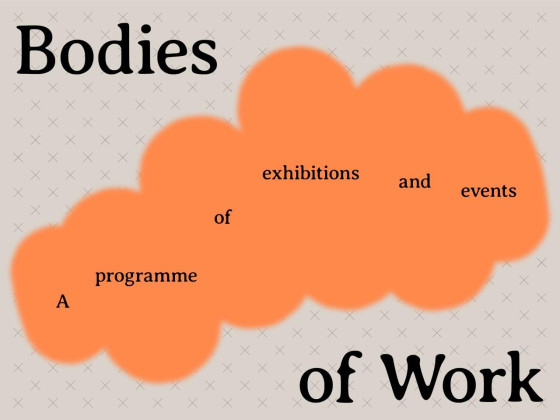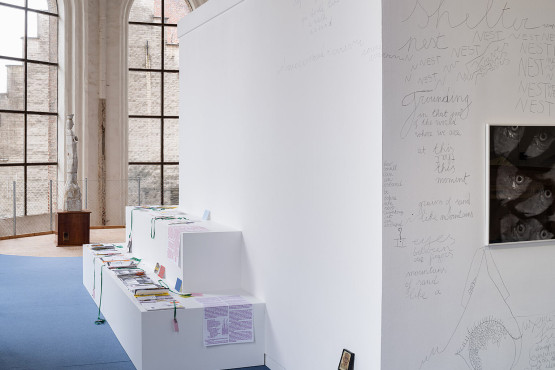
Grains of Sand Like Mountains
A group show curated by the Curatorial Studies class of 2023-24
31.05–30.06.2024, 20:00
Kunsthal Gent
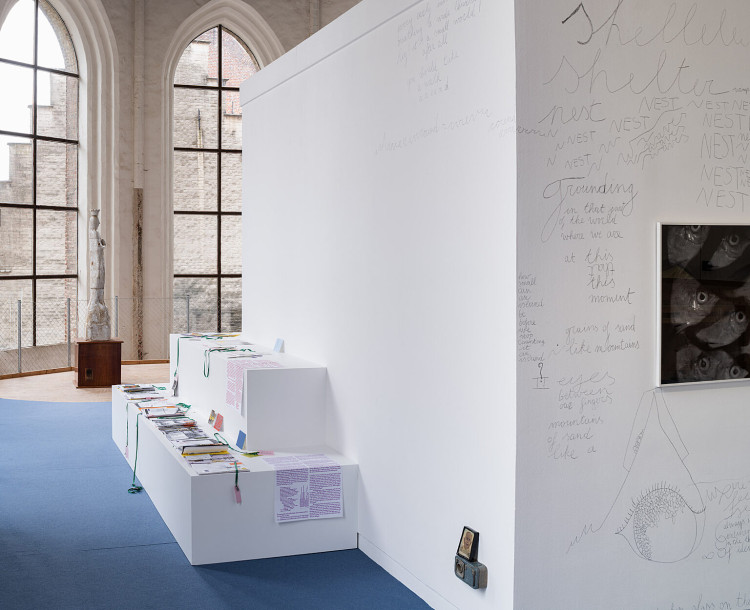
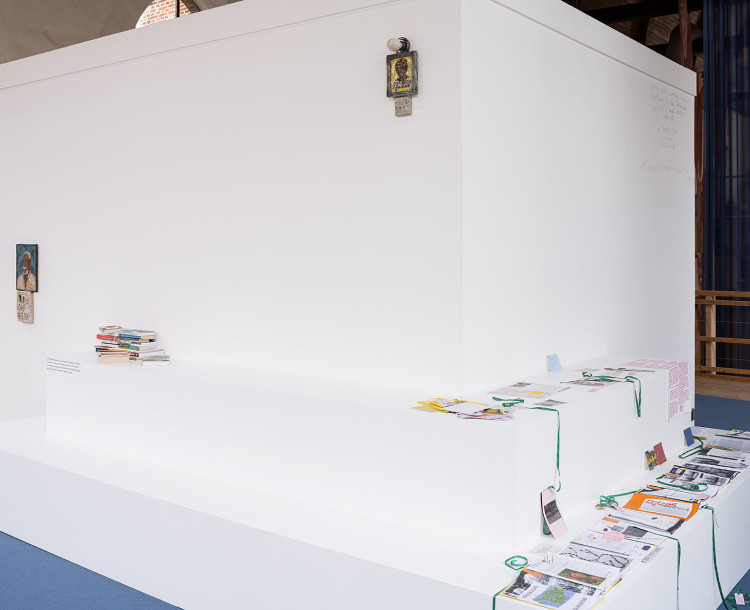
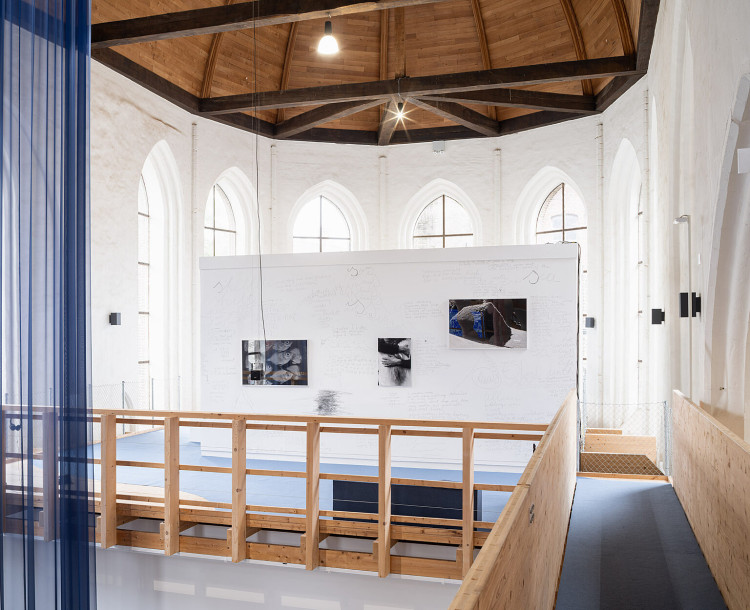
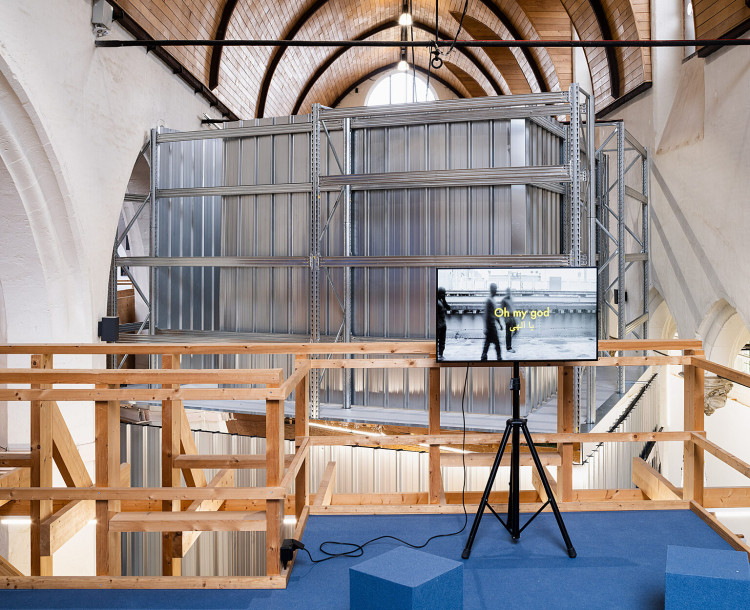
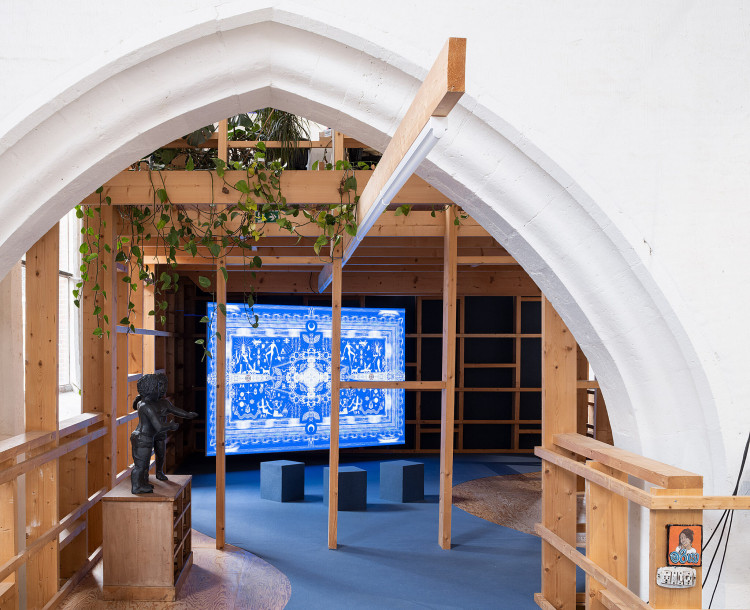
Opening: Friday, May 31, 2024, at 20:00 PM
Exhibition: 01.06.24-30.06.24
Location: Kunsthal Gent, Lange Steenstraat 14, 9000 Ghent, Belgium
Satellite Project: Graduation show at Het Paviljoen (Graduation 2024)
Exhibition: 27.06.24 - 30.06.2024
Location: KASK & Conservatorium, Louis Pasteurlaan 2, 9000 Ghent, Belgium
Participating artists: Noor Abed, Common Ground, Disarming Design, Alice Diop, Nina Jayasuriya, Seppe-Hazel Laeremans, Seulgi Lee, Renée Lorie, Micheline Nahra, Ben de Raes, Hussein Shikha, Stef Van Looveren
Grains of Sand Like Mountains is a group exhibition and a public programme curated by the Curatorial Studies class of 2023-2024. The exhibition’s title is borrowed from a poem by the artist Renée Lorie in the framework of her new photographic project Shelter (2024), which explores the conflicting feelings of belonging and loneliness she encountered on the Shetland Islands.
Taking our own experiences in curating this show together as a starting point, we raise questions about how multiple ‘I’s’ can work, live, belong and organise as an ‘us’. Collectivity, however, is multi-layered and complex; it can manifest as celebration, play, debate or assembly.
Within a few years, challenges of pandemic restrictions and isolation have moved to confronting and unsettling realities of enduring conflicts. Terms like confinement and ceasefire have become integral parts of lives. In reaction to this perpetual state of uncertainty, some ritual practices resurface while others take on new dimensions: from gathering around a table to embracing a moment of celebration, finding solace in grief, and assembling in protest.
The exhibition unfolds through a constellation of works including video, sculptures, photography, and performances, exploring how we can live together within diverse societal contexts. Manifestations of collectivity can take various forms, from the forced gathering of undocumented workers in Brussels, as witnessed by Ben de Raes in Waiting Working Hours (2019), to the elusive orality of folk culture in Brittany portrayed through Seulgi Lee’s video ÎLES AUX FEMMES (2019).
Grains of Sand Like Mountains is approached as an archipelago, allowing the encounter of collective practices within intersecting cultures. This is made tangible in the ceremonial gathering within the Palestinian community depicted in the video work Out of Joint (2018) by Noor Abed, as well as in Micheline Nahra’s sculptural work Dinner for One (2019) in which she portrays the lasting effects of war, displacement, and solitude in Lebanon.
Furthermore, alternative perspectives on the discourse surrounding shared and mixed-up heritages are explored by Nina Jayasuriya in magē gear magē pansala (2023), while Hussein Shikha looks into the symbolism and history of motifs within Southern Iraqi carpet traditions in his video installation GARDEN_OF_EDEN.ISO (2023). Finally, touching on the notions of gender, genderlessness and personas, Stef Van Looveren’s film Radical Hope (2018) looks into different stages of life, all linked to emotions of sadness, anger, desire, happiness, resentment and terror, where at the end, individuals merge into one.
Public programme
Accompanied by an extensive public programme, this exhibition also considers the audience as partaking in a reflective communal experience. The programme will feature a workshop by Disarming Design for Palestine, a film screening of Nous (2020) by Alice Diop and a collective dinner during which the CS participants will reflect on the collaborative curatorial approaches and processes that took place while organising this exhibition, such as collective choices or negotiations, challenged assumptions, prompted growth and personal reflections among us.
Satellite project
Playing with the notion of relationality, a satellite project unfolds at Het Paviljoen, extending its reach beyond the walls of Kunsthal Gent and allowing for multiple spatial trajectories. While forming a cross-over between both spaces, Seppe-Hazel Laeremans looks into the deconstruction and reconstruction of hegemonic visual language through a collective performative reading session, which will lead to a walking tour between Kunsthal Gent and Het Paviljoen. Finally, reinforcing the notion of collaboration, we join forces with Café Palestine and Splinter v.z.w. to co-host an event by the art collective Common Ground that invites us, in a contemplative manner, to gather and join in the timeless ritual of preparing a traditional Palestinian dish.
Accessibility
The exhibition starts on the ground floor with works by Seppe-Hazel Laeremans and Disarming Design, and will mainly unfold through the first floor. Kunsthal Gent is wheelchair accessible via the ramp at the entrance, but it is important to note that the first floor is only accessible by stairs and a bridge through the hall of the building. A video of the exhibition upstairs will be available to watch on the ground floor.
An exhibition curated by Curatorial Studies Class of 2023-2024: Ipek Aytekin, Sina Eden, Max Ferguson, Ismini Kyritsis, Martina Lattuca, Manon Laverdure, Justine Mckenna, Karel Op ‘t Eynde, Emidio Ranieri Tomeo, Hugo Roger, Paula Swinnen, Camille Van Meenen, Lisa Verhaeghe
Special thanks to Laura Herman, Valentijn Goethals, Isabel Van Bos, Sonia D’Alto, Marijke Van Eeckhaut, Galerie Jousse Entreprise, argos centre for audiovisual arts, Totem Films, Kunsthal Gent Team, Design Museum Gent, S.M.A.K., Ghent University, KASK & Conservatorium.
Public programme
All of our public programmes are organised in a relaxed manner—feel free to come and go as you like in your own time. However, screenings will start on time.
Opening
Friday, 31st of May 2024
Kunsthal Gent
20:00
Screening
Alice Diop, Nous (2020, 115 mins, French with English subtitles)
Friday, 7th of June 2024
Cinema Kunsthal Gent
Arrival 19:30, start of film 20:00
Soup and bread will be served before the film starts
The RER B is an urban train that traverses Paris and its environs from north to south. Multi-award-winning documentary filmmaker Alice Diop takes us through these suburban spaces and confronts us with some of the faces and stories of which they are composed. Documenting people as fragments, the ephemeral yet everyday in-between places they share, Alice Diop proposes another way to look at the production of dominant images, and reflect on the foundation of creolized and hybridized contemporary Western societies. In her documentary Nous, she takes up the approach taken 30 years ago by French writer François Maspero in his book Les Passagers du Roissy Express, in which he recounted subjective experiences of RER B users, a line of transport crossing the city of Paris from north to south. With the point of view of her own history, she takes this same route and gathers, in the present, the memory and traces of people who have never been told. This journey is not meant to be brought to a close, but rather to continue telling a story, adding layers to it, as an invitation to pass on the baton.
Bio
Alice Diop was born in 1979 and raised in the Cité des 3000, a neighbourhood in the Parisian suburb of Aulnay-sous-Bois. In her work, she sets out to make visible those people she is “conditioned to reject”, to anchor their place in film history. She studied history at the University of Evry and documentary film at La Femis in Paris. She made her debut in 2005 with La Tour du monde, a docuseries in which she returns to the suburb where she grew up. This was followed in 2011 by La Mort de Danton, a movie about a 25-year-old black man from the Paris suburbs who tries to escape violence by taking an acting course. It was later followed by La Permanence (2016), and Nous (2021), among others. Saint Omer, Diop’s first feature-length film, immediately won the Grand Jury Prize at the 2022 Venice Film Festival. Since 2022, Diop has been co-curating the programme for “La Cinémathèque idéale des banlieues du monde” at the Centre Pompidou. (Bio derived from Sabzian)
Collective Dinner
Saturday, 8th of June 2024
Kunsthal Gent
16:00 - 18:00 cooking session
18:00 - 21:00 eating & talking
Sign-up form to follow
Grains of Sand Like Mountains is a collectively curated graduation show that is part of the programme of Curatorial Studies at KASK & Conservatorium in Ghent. This year’s participants invite you to converse about collective curatorial experiences over a shared homemade meal. As a self-reflective gesture, situated within an exhibition about the complexities of communal agency and collective identity, the curatorial students hope to bring forward their personal and shared experiences from this temporary collective curatorship and engage in a conversation with those who join the cooking session or the dinner table.
Labour of Love
A proposal by Common Ground in collaboration with Café Palestine and Splinter v.z.w.
16th of June 2024, all day
‘t Oud Huis, Kunsthal Gent
This is an invitation to join in the timeless ritual of preparing a traditional Palestinian dish - Rolled Vine Leaves, or 'ورق عنب'. This labour-intensive and contemplative process offers a space for mourning, introspection, and communal bonding. Together we weave stories of liberation, what does a free Palestine and by extension, a free world look like?
Bio
As a duo, Anna Celda and Saja Amro work under the name of Common Ground. Though their individual practices vary wildly, they found a link in the kitchen, where they have been cooking together ever since they met. Since finding this common playground they have been working on providing food experiences based on the familiar tastes and values their cultures share. The act of breaking bread with one another and feeding the community around them is at the core of what they do.
Café Palestine is a ‘Healing and Hearing space’, created on the initiative of the GentsKunstenOverleg and NTGent. The nomadic café was hosted by NTGent arca, arts centre Viernulvier, Campo Boma, etc. They are currently hosted by Kunsthal Gent. Vzw Manoeuvre and Vzw Splinter bring people together through artistic and activist projects.
Infrastructures for Solidarity; a Disarming Design workshop
Disarming Design on art-run solidarity infrastructures
Saturday, 22nd of June 2024
‘t Oud Huis, Kunsthal Gent
From 14:30 an ongoing conversational pop-up shop with Sulaiman Saleh
15:00-18:00 Unpacking notions and building threads, a Disarming Design workshop with Annelys de Vet
19:00 United Films for Palestine screening, Picasso in Palestine by Rashid Masharawi (52 minutes)
A reflective afternoon with Disarming Design for Palestine centres on developing infrastructures for solidarity through design. The session includes a workshop where participants collectively create graphic statements for a 'Fair Glossary' exhibition, focusing on design infrastructures, language, and fair trade. The event wraps up with a film screening that offers insights into the product-making processes and their narratives.
Bio
Disarming Design from Palestine (DDfP) is an independent non-profit organisation that operates as a design label and learning platform. Their mission is to foster thought-provoking design from Palestine by developing and distributing useful products that share poetic and political statements. Often rooted in experiences from everyday life in occupied Palestine, the items serve as cultural artefacts that catalyse conversations. Disarming Design is a collective based in Sint Pieters Leeuw, Belgium. Their work has been featured in De Appel, Amsterdam, Decoratelier, Brussels and Pianofabriek, Brussels.
United Screens for Palestine is an open and decentralised collective of programmers, cultural workers and venues. They are responding to the paralysis brought about by the ongoing genocide as well as the increasing policing, censorship and criminalisation of everything Palestinian. They aim to make each screening a space for conversation, learning and most of all, mobilisation. And they firmly believe that to present these films is to insist that witnessing is an active process, far beyond the act of watching. Ultimately, they build on long-standing global film initiatives which serve as platforms for substantive discussions and an earnest exploration of the historical narrative of Palestine.
Collective reading in movement with Seppe-Hazel Laeremans
Saturday, 29th of June 2024
Start: Kunsthal Gent
End: Het Paviljoen, Bijloke Site, Louis Pasteurlaan 2, Gent
15:00 - 18:00
Sign-up form to follow.
Grains of Sand Like Mountains makes a bridge to another cultural island in Ghent. Seppe-Hazel Laeremans organises a collective reading at the exhibition in Kunsthal Gent and a collective gathering at the experimental art space Het Paviljoen. They invite you along on a walking tour from one space to another.
The afternoon will start by gathering in the exhibition Grains of Sand Like Mountains where a collective reading will happen, hosted by Laeremans. This performance will seep into a walking tour, and the event will end at Het Paviljoen with a moment for afterthoughts on the grass of the Bijloke site. Seppe-Hazel Laeremans is one of the residents of the project, Jumping Fences in Het Paviljoen.
The picnic will provide vegan-friendly snacks and drinks. The walking tour from Kunsthal Gent to Het Paviljoen will last around 30 minutes.
Bio
Seppe-Hazel Laeremans (b. 2000) is a Belgian graphic designer, artist, writer, and editor currently based between Porto and Ghent. Their work has been featured in De Verffabriek (Ghent), Projectvierennegentig (Ostend), EKA GD Stand-in School (Berlin) and Bikini Books (Porto). Seppe-Hazel is currently one of the residents of Jumping Fences in Het Paviljoen, Ghent.
Finissage
Sunday, 30th of June 2024
Information about the programme to follow.
